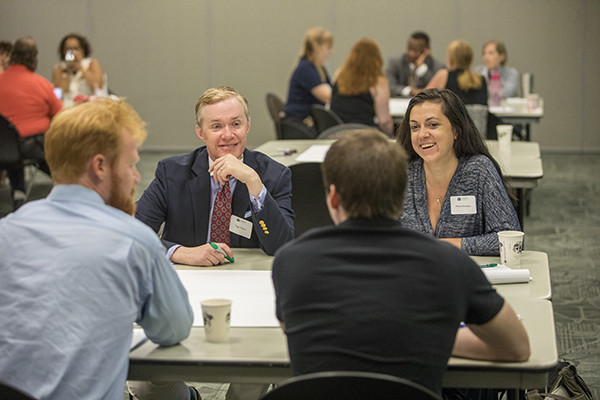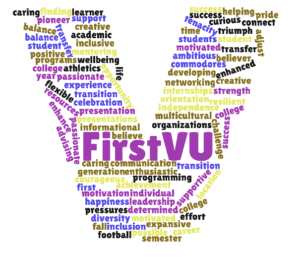
First-generation students (neither parent has a bachelor’s degree) often find navigating college to be complicated. In high school, the questions often revolve around choosing, applying and paying for college. Once on campus these students face a new set of challenges. How to study? How to manage their time? Who can they talk to? What exactly are office hours?
“These students are an important part of our university community, and we are committed to supporting them,” said Vice Provost for Learning and Residential Affairs Cynthia Cyrus. “We have several initiatives in the works. Our FirstVU student organization is taking root. We’re training faculty and staff. Our goal is to ensure this group receives highly supportive academic advising services during their Vanderbilt career.”
Cyrus’s office sponsored training this semester for faculty advisers and student affairs professionals. Cynthia Demetriou, associate vice president for student success and retention innovation at the University of Arizona, led the sessions. Participants discussed the many strengths that first-generation students bring to Vanderbilt’s campus, including independence, perseverance, creativity, flexibility and divergent thinking. They were also encouraged to advocate for first-generation students by sharing stories of personal college successes and challenges, extending individual invitations to office hours and proactively offering support.
Anarius Cathey felt that support last spring when FirstVU, a student-focused effort with the goal of supporting and celebrating first-generation students, launched with the support of the Office of Transition Programs. Although she was just a first-year student, Cathey stepped up to lead the group.
For me, I felt a bad grade was letting my family down,” she said. “I felt like I was carrying the weight of my family’s hopes and expectations.
Cathey says when she arrived on campus from South Haven, Mississippi, she felt isolated. Although she graduated at the top of her high school class, she found her education had not been challenging enough, and she was struggling in her organic chemistry class. “For me, I felt a bad grade was letting my family down,” she said. “I felt like I was carrying the weight of my family’s hopes and expectations.”
Cathey shared her story during the first-gen panel during Family Weekend in September. Also participating were Dean of Students Mark Bandas, Associate Dean of Students Frank Dobson, and Senior Assistant Provost for Faculty and Strategic Affairs Dawn Turton. Vanessa Beasley, dean of The Martha Rivers Ingram Commons, moderated.
 Cathey said the FirstVU effort connects her with students who have similar backgrounds.
Cathey said the FirstVU effort connects her with students who have similar backgrounds.
“We have a small base of members in FirstVU, and we are looking to build the organization so we can pass the torch to the next group of students,” she said.
Assistant Professor of Psychiatry Edwin Williamson, faculty head of house at Hank Ingram on The Ingram Commons, is also part of the effort. He has long been interested in helping children and young adults navigate transitions.
“At Vanderbilt we have a built-in set of resources once they get here,” he said. “But this is a very diverse group of students, and transitions often can be magnified for them. We are working to further build focused programs and a network of peers starting as first-year students so they can successfully navigate their college careers.”